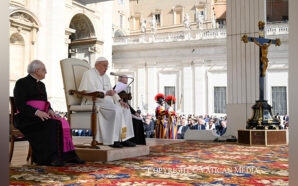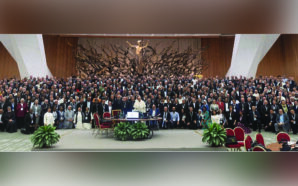Bishops and lay representatives began a 2-year process on January 30 in Frankfurt
The head of Germany’s powerful organization of Catholic laypeople has forcefully rejected charges by ultraconservatives that the two-year Synodal Path the Church has just begun will lead to schism.
“Just because a very small group of bishops and websites is fulminating evermore loudly and scathingly against the procedure, which was decided on unanimously by the bishops’ conference, does not mean that the accusations reflect reality,” said Thomas Sternberg, president of the Central Committee of German Catholics (ZdK).
The 67-year-old layman is a co-chairman of the Synodal Path along with Cardinal Reinhard Marx, president of the German Bishops’ Conference (DBK). The two men and the 230-member Synodal Assembly officially began the two-year process for reform on Jan. 30 with its first plenary assembly in Frankfurt.
Sternberg, a former Christian Democrat politician and father of five, told the web portal kirche-und-leben.de that he believes the Synodal Path will actually bring greater unity, rather than schism.
Bishops and people together
He pointed to the “exceptionally trusting cooperation” between the bishops and the laity in preparing the two-year procedure, saying this would not have been possible just a few years ago.
“To claim that only the ZdK wants reform, while the bishops cannot come to grips with these obstreperous lay Catholics, has nothing to do with reality,” Sternberg said.
He also disagreed with critics who have called the synodal procedure a sort of German Sonderweg (special path), calling the charge an imputation.
He noted that the Bishops’ Synod assembly for the Amazon, which was held last October in Rome, revealed that many of the same problems the German Church is experiencing are also present in the Latin American Church.
Some critics claim the ZdK has raised impossible expectations by insisting the Synodal Path will devise binding reform resolutions, since only the bishops could decide on the recommendations to be implemented.
Lay delegates will have a real voice
Sternberg said those who believe that need to re-read the Synodal Assembly’s agenda, which says clearly that each diocesan bishop could decide whether or not a resolution would be put into practice in his jurisdiction.
However, he added that the lay delegates at the Synodal Path would not play just an advisory role, as they do at the Synod of Bishops’ gathering, but would actually vote on resolutions along with the bishops.
There are 130 members in the Synodal Assembly, of which 69 are bishops. The other 161 are lay people; 70 of them are women.
What the Synodal Path can and cannot decree
Sternberg said the assembly would vote on three different categories of resolutions.
First, there are those that could be put into practice directly in the dioceses. Second, there are those that would be sent to Rome for consideration and/or approval. And, finally, there are” those that could not even be simply decided by a pope or an episcopal synod, but only by a council.”
The ZdK president then explained how that might work, by using the example of promoting the role of women in the Church.
He said the question of whether women could preside at Catholic funerals or become members of cathedral chapters would come under the first category; that is, it could be put into practice directly.
On the other hand, the question of whether women could be ordained deacons could only be resolved by papal decree. And, finally, only a Council could decide whether women could be ordained priests.
German Catholics are demanding reforms
More than a thousand suggestions and questions have been submitted to the synodal procedure.
They range from calls for more checks and balances within the Church to a revamping the teaching on sexual morality – “which has no longer reached many Catholics for years now”. They also include concerns over parish clusterings and environmental questions.
Sternberg said this shows how great the demand for reform is among German Catholics.
He was asked how he sees the present situation of a Church where Latin American bishop want to ordain married men, on the one hand, and Cardinal Robert Sarah is warning against caving-in to the Zeitgeist, on the other hand.
“Historically, we are in a truly remarkable situation,” Sternberg said.
“After the death of Pope Paul VI, the great reforming pope, Church reform came to a standstill for decades. There is no doubt that Pope St John Paul II brought about many significant changes, but hardly any inner-Church reforms,” he continued.
“Now, with Pope Francis, we have a pope who is stirring things up and promoting wide-ranging discussion, which certain influential personalities are vociferously opposing. But I would warn against overestimating such voices,” the lay leader cautioned.
He said he’s “fairly sure” that the Church would end up with a different constitution, though he cannot tell whether this would be a worldwide process.
“Here, in the developed world, the comprehensive rule of bishops will recede and the Church will become more democratic,” Sternberg opined.
“At least as far as the its social structure is concerned.”
They 1st plenary assembly of Germany’s two-year Synodal Path concludes on Feb. 1in Frankfurt. The second assembly will be held in the same city from Sept. 3-5.
By Christa Pongratz-Lippitt. Reproduced with his permission and La Croix International.








